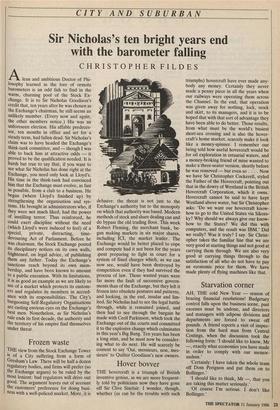Frozen waste
THE view from the Stock Exchange Tower is of a City suffering from a form of Gresham's Law. There will be half a dozen regulatory bodies, and firms will prefer (so the Exchange argues) to be ruled by the most lenient: bad regulators will drive out good. The argument leaves out of account the customers' preference for doing busi- ness with a well-policed market. More, it is delusive: the threat is not just to the Exchange's authority but to the monopoly on which that authority was based. Modern methods of stock and share dealing can and do bypass the old trading floor. This week Robert Fleming, the merchant bank, be- gan making markets in six major shares, including ICI, the market leader. The Exchange would be better placed to cope and compete had it not been for the years spent preparing to fight in court for a system of fixed charges which, as we can now see, would have been destroyed by competition even if they had survived the process of law. Those wasted years were far more the fault of successive govern- ments than of the Exchange, but they left it frozen into obsolete postures and patterns, and looking, in the end, insular and lim- ited. Sir Nicholas had to see the legal battle through, while it remained joined, and then had to see through the bargain he made with Cecil Parkinson, which took the Exchange out of the courts and committed it to the explosive change which culminates in this year's Big Bang. Ten years has been a long stint, and he must now be consider- ing what to do next. He will scarcely be content to say 'Oui, messieurs, non, mes- sieurs' to Quilter Goodison's new owners.


























































 Previous page
Previous page